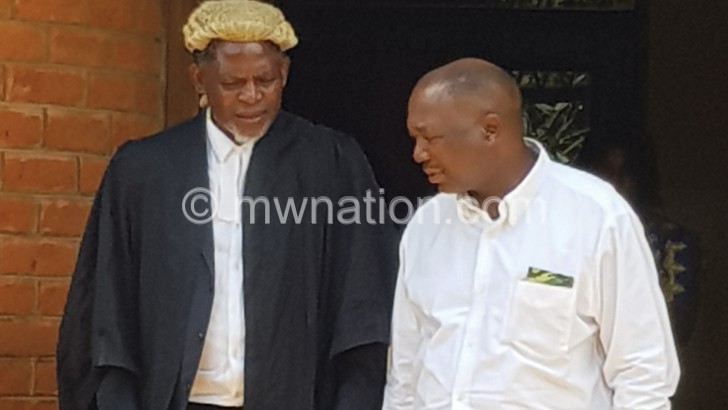Witness concedes no evidence of Odillo Cashgate role
Former Auditor General Stephenson Kamphasa yesterday conceded in court that there is no evidence from the Baker Tilly audit report implicating former Malawi Defence Force (MDF) Commander Henry Odillo in a conspiracy to defraud the State.
Kamphasa made the remarks during cross-examination from lead defence lawyer Titus Mvalo, who quizzed Kamphasa on whether the report which probed the 2012 Cashgate report directly indicates whether Odillo and co-accused persons conspired to defraud the State.

However, Kamphasa suggested a conspiracy might have taken place as he could not tell what happens “behind the walls”.
According to the prosecution’s case, under Odillo’s orders, MDF paid K9.7 million on March 13 and K920 million on August 20 2013 and ZAR30 million to Thuso Group which the State allege is neither a supplier nor a manufacturer of military ware.
Odillo, 53, former deputy commander Clement Kafuwa, 63, former Accountant General David Kandoje and Ganizani Kuchombo, 39, were arrested and now stand trial for the alleged crime.
The defence further sought to push Kamphasa into conceding a narrative that MDF top brass, including Odillo, were cheated out of the contract by Thuso Group instead of being part a fraudulent deal or a conspiracy.
The State alleges that the K2 billion contract was fictitious, with the supplier using fake invoices, which cost Treasury five times the cost of buying ammunition from normal suppliers.
The contract sum was paid just days after the contract was signed, but no single ammunition was delivered and the State further alleges that the MDF top brass and other top government officials gifted themselves proceeds of the alleged crime.
Mvalo, citing contract documents which Kamphasa had read out in court on Thursday—referred as IDP2 and IDP4 (A)—first quizzed Kamphasa whether in the audit investigations the State found that Odillo participated in the negotiations of the contract between MDF and Thuso.
Kamphasa said: “No, in the documents, nothing of that sort.”
Mvalo further asked Kamphasa to concede that Thuso, and not MDF, was responsible for obtaining of licence for arms export from the South African government to further absolve Odillo and others of failing to obtain legal documentation.
But Kamphasa insisted that Odillo and other senior MDF officers had responsibility to ensure, before approving the contract and payment, that all documentation was sufficient and the equipment was delivered.
Kamphasa said Odillo, as a controlling officer, specifically had a responsibility to ensure that a contract of such magnitude had proper documentation and cited how, as a controlling officer himself, was ensuring that this was the case on such contracts.
But with Mvalo quizzing Kamphasa whether his methodical approach could be helped by his accounting background, which Odillo lacked, Kamphasa was once again forced to concede that, that would be the case.
On several occasions, Kamphasa clashed with the defence lawyers for leading him to positions which would exonerate Odillo and others of any responsibility, arguing on several occasions that the way the contract was drafted and payments made suggested fraud.
Quizzed Mvalo: “During your investigations, did you perhaps come across or unveil any evidence that supports conspiracy?”
Responded Kamphasa: “If I say yes, I may be making a mistake, but there are traits in the whole process that makes someone wonder how did it pass all the processes?”
In another instance, Kamphasa claimed that officials at Treasury could also have been part of the fraudulent deal, arguing that it was puzzling how Treasury authorised payments without delivery notes and other documents.
“Treasury should have done more work before funding this. There were several documents which were lacking. The Treasury instructions are very clear. I am not in Treasury and I don’t know how they operate, but based on the contract, they should have not funded because the contract said payment upon delivery,” he said.
The defence further pushed to portray that other MDF officers were more responsible for getting quotations of the contract, including David Mtachi, then a defence attaché in the Malawi Embassy in South Africa.
Mtachi, allegedly, solicited the quotations from several suppliers and also cited involvement of other organs such as Treasury in scrutinising the contract as evidence that Odillo did not personally push for the contract for his benefit.
Mvalo ended his cross-examination with questions on whether the State had recovered any evidence linking Odillo to any of the cheques Thuso Group issued to reward those who participated in the deal and again, Kamphasa said there was no such evidence from the audit investigation against Odillo.
After cross-examination from other lawyers representing the rest of the accused persons, Special Cashgate prosecutor Kamudoni Nyasulu said the State will parade nine more witnesses, including those who will detail how the proceeds of the crime were shared.
Judge Redson Kapindu, however, pleaded with the lawyers on the case to avoid further delays by asking for change of dates as has been reportedly the case throughout the trial.





